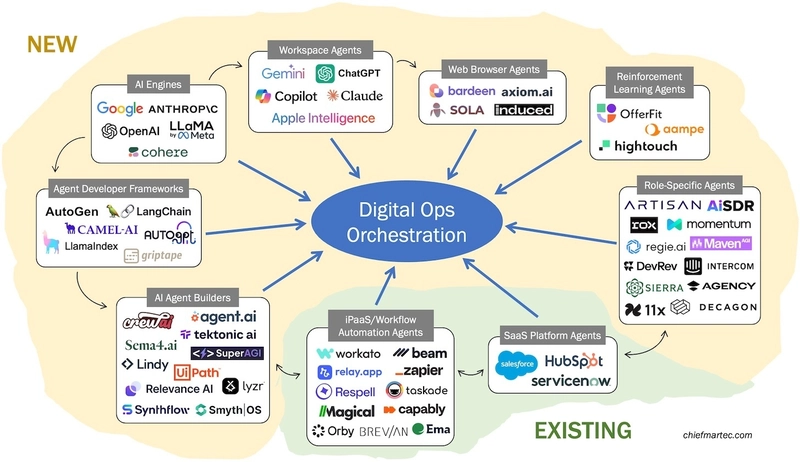Artificial Intelligence agents are no longer confined to science fiction. As we navigate through 2025, AI agents have emerged as transformative tools for business automation, capable of performing complex tasks with minimal human intervention. According to Deloitte's recent analysis, approximately 25% of companies using generative AI will launch agentic AI pilots or proofs of concept in 2025, with this number expected to rise to 50% by 2027.
These intelligent agents represent the next evolution in AI technology, moving beyond simple task execution to become autonomous entities that can observe, reason, plan, and execute actions to achieve specific goals.
The Evolution of AI Agents
The journey of AI agents has been remarkable:
- Early 2010s: Simple rule-based chatbots with limited capabilities
- 2018-2020: Introduction of more sophisticated virtual assistants
- 2021-2023: Integration of large language models into agent frameworks
- 2024-2025: Emergence of truly autonomous multi-agent systems
Recent technological advancements enabling modern AI agents include:
- Foundation Models: Large language and multimodal models provide the reasoning capabilities necessary for complex decision-making
- Agent Memory Systems: Long-term memory storage allows agents to learn from past interactions
- Planning Frameworks: Sophisticated planning algorithms enable agents to break complex tasks into manageable steps
- Tool Integration: The ability to use external tools and APIs expands agent capabilities exponentially
Types of AI Agents Dominating in 2025
Multi-agent Systems
Multi-agent systems represent perhaps the most significant advancement in AI agent technology. These systems deploy multiple specialized agents that work collaboratively to tackle complex tasks. For example, a content marketing workflow might employ:
- A research agent to gather data
- A writing agent to draft content
- An editing agent to refine the material
- A publishing agent to distribute content across platforms
This division of labor allows for more sophisticated outcomes than any single agent could achieve alone.
Purpose-built Industry-specific Agents
2025 has seen the rise of highly specialized agents created for specific industry verticals:
- Healthcare: Clinical decision support agents that assist physicians with diagnostics
- Legal: Case research agents that review precedents and relevant statutes
- Financial: Investment analysis agents that evaluate market conditions and company performance
- Manufacturing: Production optimization agents that monitor supply chains and production lines
Consumer-facing Personal Assistant Agents
Personal AI assistants have evolved dramatically, moving from simple command executors to proactive partners:
- Calendar optimization: Automatically scheduling meetings based on preferences and availability
- Email management: Drafting responses, categorizing communications, and highlighting priorities
- Personal shopping: Researching products, comparing prices, and making recommendations
- Health tracking: Monitoring metrics, suggesting improvements, and coordinating with healthcare providers
Business Impact and Use Cases
Process Automation and Workflow Optimization
Companies implementing AI agents are reporting significant efficiency gains:
- Reduced processing time: Tasks that previously took days now complete in hours or minutes
- Decreased error rates: Systematic processing eliminates common human errors
- 24/7 operation: Agents work continuously without breaks
- Scalable processing: Capacity can be adjusted based on demand
A recent case study from a Fortune 500 financial institution reported a 78% reduction in document processing time after implementing AI agents for loan application processing.
Customer Service and Support Enhancements
Customer service has been revolutionized by AI agents capable of:
- Omnichannel presence: Providing consistent support across multiple platforms simultaneously
- Personalized interactions: Drawing on customer history to tailor responses
- Complex problem-solving: Addressing multi-step issues without human escalation
- Proactive outreach: Identifying potential issues before customers report them
These capabilities have led to measured improvements in customer satisfaction scores, with some organizations reporting increases of up to 35%.
Decision Support and Business Intelligence
AI agents now serve as valuable decision support tools by:
- Data aggregation: Collecting information from disparate sources
- Pattern recognition: Identifying trends that might escape human analysts
- Scenario modeling: Projecting outcomes based on different variables
- Recommendation generation: Suggesting optimal courses of action
Implementation Challenges
Despite their potential, AI agents present several implementation challenges:
Integration with Existing Systems
Many organizations struggle with:
- Legacy system compatibility
- API limitations
- Data format inconsistencies
- Workflow disruptions during transition periods
Security and Privacy Considerations
Critical concerns include:
- Access control for agent systems
- Data handling and compliance
- Audit trails for agent actions
- Vulnerability management
Training and Adoption Hurdles
Human factors remain significant:
- Employee resistance to new technologies
- Skills gaps in agent management
- Unclear responsibility divisions
- Maintaining appropriate oversight
Future Outlook
The trajectory for AI agents beyond 2025 points to:
- Increased autonomy: Agents making more complex decisions with less oversight
- Enhanced collaboration: More sophisticated multi-agent orchestration
- Specialized verticals: Industry-specific agent ecosystems
- Democratized development: More accessible tools for creating custom agents
Industry standards are beginning to emerge around:
- Agent interoperability frameworks
- Security protocols for autonomous systems
- Testing methodologies for agent performance
- Ethical guidelines for delegation of tasks
Conclusion
AI agents represent a paradigm shift in how organizations approach automation and decision support. The technology has matured significantly, moving from experimental applications to production-ready systems delivering measurable business value.
For organizations considering implementation, key recommendations include:
- Start with well-defined, high-value use cases
- Implement proper governance frameworks before deployment
- Invest in training for employees who will work alongside agents
- Establish clear metrics for evaluating agent performance
As we move forward, AI agents will continue to transform how businesses operate, creating new opportunities for efficiency, innovation, and competitive advantage.









Top comments (0)